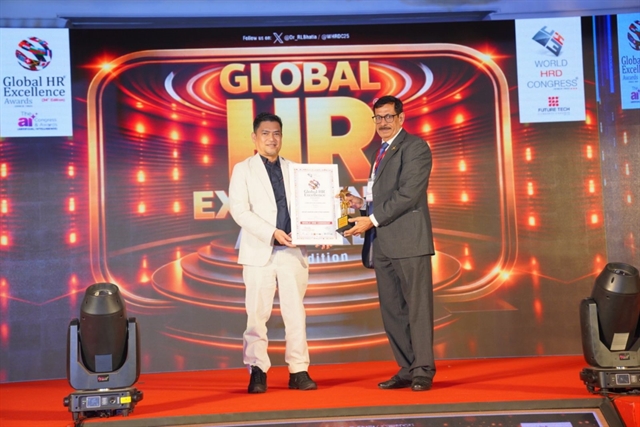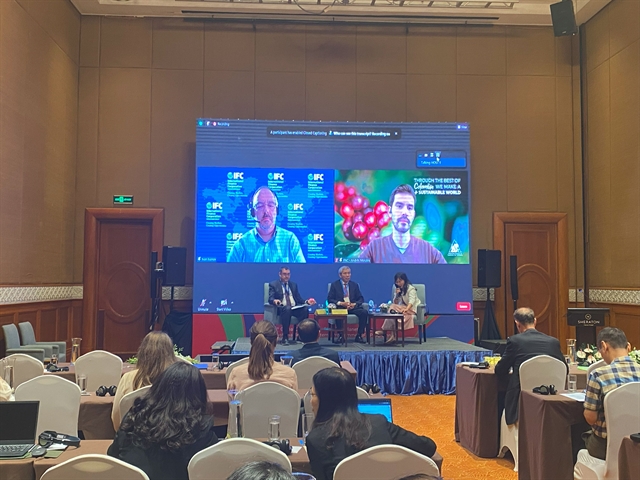 Economy
Economy

 |
| A view of the side event on deforestation-free agricultural production and trade held by UNDP and Vietnam Administration of Forestry on April 25, in Hà Nội. VNS Photo Hoàng Hà |
HÀ NỘI — Việt Nam's agricultural sector needs to move toward sustainable development along value chains of production and trade to prevent deforestation and land degradation.
Trần Quang Bảo, deputy director of Việt Nam Administration of Forestry, Ministry of Agriculture and Rural Development, made the statement at a side event on deforestation-free agricultural production and trade held by the United Nations Development Programme (UNDP) in collaboration with Việt Nam Administration of Forestry on Tuesday, in Hà Nội, as part of the 4th Global Conference of the One Planet network's Sustainable Food Systems Programme.
The side event brought together the experience and expertise of various institutions as well as case studies of emerging good practice interventions to adapt to the requirements for deforestation-free commodity production and trade.
With the orientation of sustainable development, Việt Nam needs to not expand land area for agriculture but it must increase the quality and value of farming products as well as enhance the livelihoods of the community, Bảo said.
According to Bảo, agricultural farming is considered one of the large-scale land-using industries. The current expansion of land for agricultural development in the world is the main cause of deforestation and the shrinking of forest land.
In a world in which agricultural expansion drives almost 90 per cent of global deforestation, deforestation-free regulations and commitments need to be well understood and translated into positive actions on the ground.
Therefore, 141 countries, containing 90 per cent global forest coverage, are also signatories to the Glasgow Declaration on Forest and Land Use committed to "halt and reverse" forest loss and land degradation by 2030, at the same time "delivering sustainable development and promoting an inclusive rural transformation", he said.
Meanwhile, Europe has passed regulations to ban the import of goods relating to deforestation. Accordingly, import and export companies will have to trace the origin of imported products sold on the European market for verification to be produced on land that has not been subject to deforestation or forest degradation, Bảo said.
At this side event, Rui Ludovino, the First Counselor for Climate Action, Environment, Employment, and Social Policies at the Delegation of the European Union to Việt Nam, introduced the process of defining a roadmap towards sustainable, deforestation-free imports to the EU, and the next steps required to prepare countries for implementing the EU Deforestation Regulation (EUDR).
According to Ludovino, Việt Nam is implementing the Việt Nam-EU Trade Agreement and the Forest Law Enforcement Governance and Trade Voluntary Partnership Agreement (FLEGT-VPA). Those agreements create a legal framework for timber and wood products exported from Việt Nam and for sustainable development of the wood industry.
Especially, the VPA/FLEGT allows Việt Nam to have a forest governance process that other industries can follow such as rubber and coffee.
Ludovino said that the wood and coffee industries will be greatly affected by EU regulations. Therefore, countries need to have a monitoring system to ensure that the agricultural products in the supply chain are not connected to deforestation.
Việt Nam is a country that is not at too high risk of deforestation thanks to forest protection policies. But it needs to strengthen more control of the supply chain of Vietnamese agricultural products to penetrate deeper into the EU market, said Ludovino.
“With the recent global context and regulations on sustainable production and commercialisation and deforestation-free supply chains, UNDP is ready to work with government partners and the private sector to create an enabling environment for a sustainable deforestation-free agricultural product supply chain and to support the deforestation-free production and commercialization model for the benefits of the environment and people, especially smallholders," said Patrick Haverman, Deputy Resident Representative, UNDP Việt Nam.
According to Haverman, "instead of introducing completely new policies, laws, regulations and programs to meet the new and emerging international requirements such as the EU deforestation-free regulation, the next step is to demonstrate how existing enabling environment and system could be connected to these regulations, and how to improve it to promote direct changes for innovative transformation to tackle climate change and deforestation."
"More than ever, stakeholders such as the users and buyers, and financial institutions have a more prominent role in shaping the market, and sustainable and responsible consumption that will drive sustainable production and supply chains."
"Smallholder farmers and producers will be the most affected if sustainable and deforestation-free regulations are applied due to the expensive and stringent due diligence process. Therefore, measures need to be incorporated to support and protect these vulnerable groups," he said.
For sustainable development without causing deforestation, the project “Integrated Sustainable Landscape Management Through Deforestation-Free Jurisdiction project in Lâm Đồng and Đắk Nông provinces, Việt Nam” (iLandscape) is implemented by UNDP together with MARD and these two provinces. The project is funded by the European Union through UNDP Viet Nam with a total budget of 5 million euros.
The project targets to protect 25,000 hectares of natural forest, reduce harmful CO2 emissions by 3 million tonnes, enable 35 per cent of the project area's marginalised populations in both provinces to benefit from improved livelihoods, especially women and ethnic minorities, and increase the total value of commodities in the project area by 25 per cent. VNS